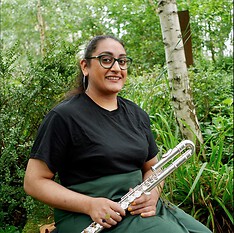Diljeet Kaur Bhachu
I Thought It Was Normal to Be the Only One: On Becoming Aware of Racism
Following the report ‘Slow Train Coming? Equality, Diversity and Inclusion in UK Music Higher Education’, in this presentation I address possible explanations for the under-representation of British Asian students in Music HE. I reflect on current initiatives and challenges in anti-racism practice in the UK’s classical music sector, from the vantage point of a Trade Union.
Drawing on my doctoral research, I highlight the subtle but significant impact of WAM ideologies as they are manifested in school music education, alongside reflections on my encounters with coloniality and race(ism) as a doctoral student and early career researcher. Seeking to challenge the unspoken rules of who gets to be/do what in academia, I close by reflecting on my musical practice as a mode for challenging coloniality and racism.
 Dr Diljeet Kaur Bhachu is a musician, activist, researcher and now Equality, Diversity and Inclusion Officer at the Musician’s Union, the UK’s trade union for musicians. She continues to perform, both in her solo practice which focusses on improvisation, and as a session musician with artists such as Kapil Seshasayee. Diljeet has been involved in the trade union movement for many years, taking up post with the Musicians’ Union in late 2022, where she brings her academic practice into the music industries to advocate for positive change. Diljeet is a co-author of the Equality, Diversity and Inclusion in Music Studies (EDIMS) report ‘Slow Train Coming? Equality, Diversity and Inclusion in UK Music Higher Education, and has a forthcoming chapter in a volume titled ‘Made in Scotland’ which questions the idea of ‘Scottishness’ interrogating national identity, creativity and racism. Diljeet’s doctoral thesis explored colonialities in music education in Scotland, looking at the impact of Western European Art Music ideals on teachers’ musical identities and perceptions of what music education should be about.
Dr Diljeet Kaur Bhachu is a musician, activist, researcher and now Equality, Diversity and Inclusion Officer at the Musician’s Union, the UK’s trade union for musicians. She continues to perform, both in her solo practice which focusses on improvisation, and as a session musician with artists such as Kapil Seshasayee. Diljeet has been involved in the trade union movement for many years, taking up post with the Musicians’ Union in late 2022, where she brings her academic practice into the music industries to advocate for positive change. Diljeet is a co-author of the Equality, Diversity and Inclusion in Music Studies (EDIMS) report ‘Slow Train Coming? Equality, Diversity and Inclusion in UK Music Higher Education, and has a forthcoming chapter in a volume titled ‘Made in Scotland’ which questions the idea of ‘Scottishness’ interrogating national identity, creativity and racism. Diljeet’s doctoral thesis explored colonialities in music education in Scotland, looking at the impact of Western European Art Music ideals on teachers’ musical identities and perceptions of what music education should be about.
